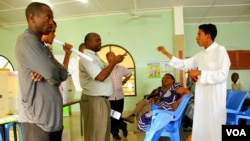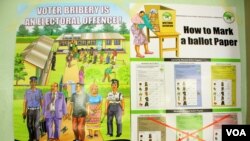MOMBASA —
The Kenyan election season is well under way, and the Independent Electoral and Boundaries Commission is trying to educate the electorate on polling procedures and the steps the commission is taking to eliminate fraud. Part of this work includes educating the political candidates themselves.
Politicians assembled in a crowded meeting room in Mombasa recently to discuss issues pertaining to the upcoming March 4 Kenyan elections. They have a particular stake in ensuring that the elections are free and fair, and they were not shy in expressing their grievances with Independent Electoral and Boundaries Commission representative Frank Mwalenga.
Mwalenga says that the IEBC is holding these politician education sessions throughout Kenya because the candidates need to know that no fraudulent activity will be permitted.
“It’s important that we all read from the same page because we are aware that the last elections had a lot of issues," he said. "But right now, we want the candidates to be fully aware of the laws, which are, let’s say for example, there is a code of conduct governing their conduct in campaigns. They are supposed to keep this and all those manners of issues.”
Management consultant Rashid Nzambu is currently working with a political aspirant from Mvita constituency. He attended the IEBC session and says he found it very useful.
“It allowed many of the candidates to verify some of the facts about the electoral process, i.e. what’s going to happen on the polling day. There were so many things which were not clear. Although most of us had already come to the IEBC office and things had been clarified for us. But it was good that all the candidates could sit together and be able to ask questions and get answers,” said Nzambu.
Fear factor
Nzambu says that many of the candidates at the IEBC session were concerned about technical and procedural problems on election day.
“People are fearful about the machines, whether there is going to be power on that day," he said. "Whether they are going to be able to allow enough people to vote in the given time, that is, before five o’clock, five p.m. And the returning office here said everybody who will be at the polling station will be allowed to vote, even if it will take how long.”
However, although there are worries about logistics, Mary Oyiar, a candidate running for Mombasa county representative, says the overriding fear is electoral fraud.
“Bribery is the most common thing in Mombasa. You see there are candidates who are wealthy - wealthy, wealthy candidates," said Oyiar. "They normally go to a polling station, stand by, and attend to whoever is coming. They give them a photo or whatever, and [tell them] please go and vote for this person with maybe two or five hundred shillings [about $2.30 or $5.80] a turn. So they change the voter’s mind on the spot.”
Janet Mirobi is another contender vying for the Mombasa county representative seat. She agrees with Oyiar that money is often exchanged for votes and says this puts under-resourced candidates like herself at a clear disadvantage.
“The big worries are that the people who have big money, they are buying even the people there," said Mirobi. "Even the policemen - you can report and they don’t respond to you because you don’t have money to give them. They have been given money. That’s why you see we are complaining. What are we going to do because of these big fish who have money? Because most of the candidates here, we don’t have money. The big people who’ve been there, they’re having money.”
Commission's dedication
Acknowledging that these issues have been a problem in the past, Mwalenga of the IEBC says that the commission is dedicated to transparent elections this time around.
“I’m very serious about the issues and right now, the law empowers us as elections officials to follow up these issues because we want all the candidates to see us as being fair," said Mwalenga. "So we don’t want any candidate to be beaten up, to be discriminated against just because maybe he doesn’t have enough resources. So in this, we are going to make sure that whoever breaches the law, the law should take course.”
According to the IEBC, Mombasa county has registered 432,000 voters for the upcoming election, which is 94 percent of the commission’s target.
Politicians assembled in a crowded meeting room in Mombasa recently to discuss issues pertaining to the upcoming March 4 Kenyan elections. They have a particular stake in ensuring that the elections are free and fair, and they were not shy in expressing their grievances with Independent Electoral and Boundaries Commission representative Frank Mwalenga.
Mwalenga says that the IEBC is holding these politician education sessions throughout Kenya because the candidates need to know that no fraudulent activity will be permitted.
“It’s important that we all read from the same page because we are aware that the last elections had a lot of issues," he said. "But right now, we want the candidates to be fully aware of the laws, which are, let’s say for example, there is a code of conduct governing their conduct in campaigns. They are supposed to keep this and all those manners of issues.”
Management consultant Rashid Nzambu is currently working with a political aspirant from Mvita constituency. He attended the IEBC session and says he found it very useful.
“It allowed many of the candidates to verify some of the facts about the electoral process, i.e. what’s going to happen on the polling day. There were so many things which were not clear. Although most of us had already come to the IEBC office and things had been clarified for us. But it was good that all the candidates could sit together and be able to ask questions and get answers,” said Nzambu.
Fear factor
Nzambu says that many of the candidates at the IEBC session were concerned about technical and procedural problems on election day.
“People are fearful about the machines, whether there is going to be power on that day," he said. "Whether they are going to be able to allow enough people to vote in the given time, that is, before five o’clock, five p.m. And the returning office here said everybody who will be at the polling station will be allowed to vote, even if it will take how long.”
However, although there are worries about logistics, Mary Oyiar, a candidate running for Mombasa county representative, says the overriding fear is electoral fraud.
“Bribery is the most common thing in Mombasa. You see there are candidates who are wealthy - wealthy, wealthy candidates," said Oyiar. "They normally go to a polling station, stand by, and attend to whoever is coming. They give them a photo or whatever, and [tell them] please go and vote for this person with maybe two or five hundred shillings [about $2.30 or $5.80] a turn. So they change the voter’s mind on the spot.”
Janet Mirobi is another contender vying for the Mombasa county representative seat. She agrees with Oyiar that money is often exchanged for votes and says this puts under-resourced candidates like herself at a clear disadvantage.
“The big worries are that the people who have big money, they are buying even the people there," said Mirobi. "Even the policemen - you can report and they don’t respond to you because you don’t have money to give them. They have been given money. That’s why you see we are complaining. What are we going to do because of these big fish who have money? Because most of the candidates here, we don’t have money. The big people who’ve been there, they’re having money.”
Commission's dedication
Acknowledging that these issues have been a problem in the past, Mwalenga of the IEBC says that the commission is dedicated to transparent elections this time around.
“I’m very serious about the issues and right now, the law empowers us as elections officials to follow up these issues because we want all the candidates to see us as being fair," said Mwalenga. "So we don’t want any candidate to be beaten up, to be discriminated against just because maybe he doesn’t have enough resources. So in this, we are going to make sure that whoever breaches the law, the law should take course.”
According to the IEBC, Mombasa county has registered 432,000 voters for the upcoming election, which is 94 percent of the commission’s target.





